When you ask a room (or hundreds of rooms) of circles of chairs what their favorite recovery book is, it will often be this title: Drop the Rock: Removing Character Defects.
In it, the authors (pseudo-anonymous - how cool is this?) describe steps 6 and 7 in the Big Book of Alcoholics Anonymous, which are steps that focus on “character defects,” as defined by the 12-steps.
Here is a quick run down if your AA-speak is a little rusty like mine:
6. Were entirely ready to have God remove all these defects of character.
7. Humbly asked Him to remove our shortcomings.
The book discusses the heavy rocks we often carry into recovery like emotional hurts, resentments, fears, and other “character defects,” as the book shares. It guides readers along a process of how to drop these rocks and let go to live a more joy-filled and abundant life.
Interestingly, the story is set on a ship called Recovery that is sailing towards the Island of Serenity. It's a bit heavy on the nautical imagery if you ask me, but who am I to dis a super popular book for many in the recovery community, especially those who subscribe to 12-step recovery pathways?
I appreciate this book and the variety of recovery resources, quit-lit titles, and more out there because, just like in recovery spaces, stories can move us.
Stories move us to not only find connection with our own stories but propel us outwards to do something about whatever situation we might find ourselves in, whether that’s with a bag of rocks we can’t drop (yes, pun intended for those who get it) or something else.
Photo by Nick Fewings on Unsplash
Over the years, I’ve longed to release the things that weigh me down. Anxiety, depression, substance use, relationship challenges, issues with food, resentments, pride, and more.
What have you wanted to set down? What rocks are you carrying that you can’t seem to drop no matter how hard you try?
For me and countless others, anxiety and depression are two rocks that weigh us down today or resurface when life gets challenging or something triggers us. Sometimes when we are least expecting it. They may not be what folks traditionally think of when we talk about “character defects” (and for good reason), yet they are things that we want to release.
When I recently surveyed hundreds of people in this community, the #1 thing you want to learn more about is mental health and recovery, including how to address anxiety and depression.
[Digression: anyone else curious why some pairs just seem to fit well together? Ketchup and mustard? Sugar and spice? Salt N’ Peppa? Anxiety and depression?]
For years, my own diagnoses bounced back and forth between these two mental health challenges to extremes we don’t have the time to get into today. Let’s just say it was like living on a stormy, unpredictable sea.
What I did learn over time was that these two rocks were the result of not just brain chemistry and wiring that had been handed down to me genetically, but also the response my body and mind had to the trauma I had experienced. Someone may need to hear this especially today: it is normal to have a response to the difficult circumstances.
I’d later learn that the deluxe combo of A and D was also a third surprising rock, post-traumatic stress disorder.
Whatever rocks you are carrying, whether that is a character defect or two as defined by the 12-step literature or whether or whether it is anxiety or depression that your loved one just can’t seem to drop, one of the things I aim to do in this weekly letter is to give you hope.
Things can get better. We can change. Right down to the way our brains are wired.
Theologian and brain surgeon (a not-so-common pairing),
shares that:Your brain is constantly making new synapses, breaking old ones, and wiring neurons together in a way that makes brain habits get stronger with repetition and die off with disuse (neuroplasticity, or the brain’s ability to change when directed to by mind-down control). Hebb’s Law is the famous, “Neurons that fire together, wire together,” so let’s make that work for us instead of against us.
You can harness the power of neuroplasticity to unlearn harmful patterns, reinforce helpful ones, unlabel yourself from old stories and limiting beliefs, and overcome anything that’s holding you back.1
In other words, the brain can heal.
We can uproot unhealthy patterns.
We can drop the rocks.
We can heal.
The brain is resilient and powerful, just like the spirit. Importantly, our actions—healthy actions—can rewire our brains even if anxiety and depression are woven into our DNA.
Don’t be surprised if, when you get sober, other things resurface (like a game of Whack-a-mole). Address one and another pops up in its place. Addiction can mask underlying issues and mental health challenges.
But the good news is that there are things we can do to address our anxiety, depression, or any other mental health challenge we may be facing. We can take action to not only feel comfortable in our skin but be comfortable in our skin. At peace and at ease.
We may still struggle sometimes (we are human after all), but there are things we can do to drop the rocks we might be carrying.
Resources for your journey (or to share with a friend)
What do you do when anxiety won’t let go?
Check out my new booklet and journal from Smart Living with Grit and Grace.
In this resource, you will find within these pages the steps to conquer anxiety and adopt the tools she used to take back her life—tools that will do the same for you.
This guidebook also includes an opportunity to write your story, to put words to your problems, and the steps you can take to find freedom from anxiety's clutches.
*The resource page of the eBook has a QR code that will lead you to a free, printable companion journal to use for your written responses.
After reading, you will gain encouragement and hope as you realize restarting life isn’t impossible. Learn more here.
Or, maybe your rocks are a bit more deeply rooted.
Get my new book and explore how to uproot unhealthy patterns and heal your family tree.
Practical Application
Reach out and phone a friend (text works, but calling is better – Gen Z, please answer and listen to voicemails, thank you)
Check-in with your therapist (if you don’t have one, check out this resource that can help you find a therapist in your area)
Decide if you might benefit from more support and look into your options for additional addiction treatment (here is one of my favorite treatment locator options from Recovery.com)
Set down your phone. Did you know that there is research out there that may be suggesting a correlation between worsened mental health and phone use, specifically social media? (it’s true, and studies are showing worse for young women)
We all have a heaviness about our experience, and perhaps it is in our hearts that weighs us down.
Heaviness, if we release it, can be freeing in a way we have yet to experience.
*
Now, it’s time for you to share! Part of this series will be highlighting ways that you promote your mental health or perhaps your organization, ministry, or agency supports mental health.
Will you share your thoughts or resources below that support mental health? OR, can you share a recovery book that has moved you to look at your life or recovery in new ways?
Warren, Lee. "Getting Better." Substack, 20 Sept. 2023, https://drleewarren.substack.com/p/getting-better.







Thank you so much for this topic, this post and these recommendations. 🩵🙏
I do love Drop the Rock! 😀